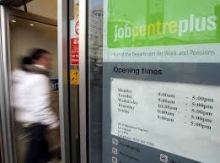Work TV
Watch our TV Channel dedicated to the ‘World of Work’. Explore our video library for informative videos featuring career opportunities at leading companies, franchising opportunities, further education and recruitment professions and their services.
Simon Collyer
Price Of Tea, Toast and Chips Up 40%
Prices Up, Ouch: New figures from the ONS has revealed the cost of basic essential family goods like tea (+46%), bread (+38%), pasta (+60%), chips (+39%) and cooking oil (+65%) has risen sharply over the past year - leaving many families struggling to put food on the table alongside rising mortgages, rents and energy bills.
Overall, the price of budget food in supermarkets rose by 17% in the year to September.

ABC Comment, have your say below:

Triple Lock Pension Under Threat
TRIPLE LOCK PENSION UNDER THREAT - Following the news that the Government has ditched its commitment to the triple lock state pension, and then the new CPI data showing inflation has hit 10.1%, please see a comment from my client below reacting to both major blows for consumers. I hope you can use it.
Andrew Megson, CEO of My Pension Expert, said: "The past 24 hours have served up two cruel blows to people's personal finances. The Government announced yesterday that it was no longer going to commit to the triple-lock state pension, which would have seen state pensions increase in line with surging inflation, which we have today learned has topped 10% again.
“These are extremely challenging times. Inflation is at eye-watering levels, interest rates are going up and up, and the Government is making us all dizzy with the number of U-turns it is performing. Liz Truss' potential abandonment of the triple-lock just two weeks after saying she was "committed" to it will be a slap around the faces of all those with a state pension.
“Financial preparedness is essential as people adapt their plans to the current economic climate. For one, the trend of more people in their 50s and 60s coming out of retirement to bolster their pension savings amid the cost-of-living crisis is expected to continue. I would say that anyone who is worried about the state of their finances should seek help from an independent financial adviser, who will help them make informed decisions. This is particularly true of those approaching or in retirement, who might feel as though their financial plans have gone up in smoke.
“All eyes now turn to 31 October and Jeremy Hunt's next fiscal statement. He has acted to calm markets and instil confidence back in the Government's handling of the economy, but he must also alleviate the strain on consumers and pension planners.”

Image: Andrew Merson, CEO, My Pension Expert.
ABC Comment, have your say below:

Inflation Hits 10.1% And Worrying Brits See Annual Food Bill Rise By £1,378
FOOD PRICES - As inflation rises to 10.1% it’s also revealed that the average weekly food shop has risen by £26.50, almost three times the national living wage, and now worrying shoppers are turning to the frozen aisles to save money.
The increase means that food shoppers will be spending an additional £1,378 a year on their annual food bill and according to new research, the rising price of fresh food is worrying 87% of Brits as the cost-of-living crisis starts to impact shopping habits.
The average household size in the UK is 2.4* meaning that homeowners are now spending, on average, £132 on their weekly food shop (£6,864 a year). With prices rising and Brits feeling the pinch, shoppers have now turned to buying frozen.
According to the research, conducted by Kirsty’s, the No.1 free from ready meal brand, three quarters of shoppers (75%) are now buying more frozen products than ever before with 71% of shoppers stating that buying frozen meals is saving them money.
According to UK shoppers, aside from the cost saving, other reasons for this switch to buying frozen is that the food lasts longer (77%), it’s cheaper (60%) and that it makes for less fresh food waste (39%).
According to the research, 26 million people in the UK suffer now from a food allergy or intolerance, an increase of 6 million since last year.
Almost one in 3 are now either lactose, gluten, dairy or wheat free and a further 9% have an intolerance to fish or eggs.
The new findings revealed that Brits who follow a free-from diet or suffer from an intolerance spend, on average, 16% more on their weekly shop.
In addition, those who follow a free-from diet or suffer from an intolerance have been affected the most by the cost-of-living crisis and rising food prices, with their average weekly shop increasing, on average, by £37, 40% more than those on a standard diet.
ABC Comment, have your say below;

Universal Credit Claimants Pushed To Work Longer Hours
UNIVERSAL CREDIT - Tens of thousands of Universal Credit claimants will come under pressure to work more hours under changes introduced by the Government. The Chancellor has raised the earnings level for claimants to reach before they stop getting intensive support to find work or develop a career.
Previously individuals on Universal Credit got the extra help if they worked the equivalent of 8.6 hours or less, or for a couple 13.8 hours between them, based on the National Living Wage. The earning level for this ‘Intensive Work Search’ group of people has now been raised to the equivalent of 12 hours a week, or 19 for a couple, at the National Living Wage of £9.50 an hour for the over-23s.
The Government says around 114,000 people on Universal Credit will now qualify for the extra support to increase their pay and get more one-to-one time with a work coach, to support the overall aim of helping the economy grow. If people fail to meet the commitments set out in their UC agreement, such as turning up for a meeting, they could lose money due to sanctions. And the Chancellor has signalled that the threshold will rise further in the coming months, bringing more people into the ‘Intensive Work Search’ category.
ABC comment, have your say below:

Chloe Smith is the New Work and Pensions Secretary in the Truss Cabinet
NEW DWP MINISTER – Something of an unknown quantity to the public, Chloe Smith will be watched closely. The government is going to be forcing people into jobs. Claimants need to be very careful to do what they are being told to do. To keep records as evidence and to be careful to back up what they say to their work coaches. To do everything to avoid being sanctioned.
This is Ms Smiths background and it is in the accountancy profession.
Biography
Chloe Smith was appointed Secretary of State for Work and Pensions on 6 September 2022.
She was previously appointed Minister of State (Minister for Disabled People, Health and Work) at the Department for Work and Pensions from 16 September 2021 to 6 September 2022.
She was Minister of State (Minister for the Constitution and Devolution) from 13 February 2020 to 15 September 2021.
She was Parliamentary Secretary at the Cabinet Office from 9 January 2018 to 13 February 2020 and Parliamentary Under Secretary of State for Northern Ireland and Assistant Government Whip for the House of Commons from 15 June 2017 to 8 January 2018.
She was elected Conservative MP for Norwich North on 23 July 2009.
Education
Chloe studied English at the University of York.
Political career
Chloe was elected MP for Norwich North in July 2009. She was appointed Economic Secretary to the Treasury in October 2011 and from September 2012 to October 2013 she served as Parliamentary Secretary for the Cabinet Office.
Career outside politics
Before entering Parliament, Chloe worked for international consultancy firm Deloitte, advising private businesses, government departments and public bodies.
Minister of State (Minister for Disabled People, Health and Work)
The minister’s responsibilities include:
- departmental strategy on disability and disability employment
- cross-government responsibility for disabled people
Employment and Support Allowance, Personal Independence Payment, Disability Living Allowance and elements of Universal Credit that relate to disabled people including the severe disability premium
- work and health strategy including sponsorship of the joint Department for Work and Pensions / Department for Health and Social Care Work and Health Unit
Carer’s Allowance
- disability benefit reform
- devolution framework
Health and Safety Executive
- COVID-19 response
- Serious Case Panel
ABC Comment, have your say below:

Your Chance To Appear on TV
FAME AWAITS YOU - A German TV Company, similar to the BBC, is looking for a family willing to comment on the energy crisis and the cost of living.
A modest fee may be available for those participating.
These are the details of the UK based reporter.
Rob Broomby
ARD TV
German TV London Bureau
Tel: 0207 391 6262
Mob: 07770 872 985
Web: https://www.ard.de
We have spoken to Rob and this is a genuine opportunity..

ABC Comment, have your say below:

Threatened Energy Price Hikes Fuel Claimant Fears
FUEL POVERTY - Universal Credit claimants face an even tougher winter than before, with energy bills set to exceed their entire income.
The energy price cap is expected to rise to £4,200 at the beginning of next year, according to forecasts.
In comparison, the standard allowance for a single person on Universal Credit is currently around just £4,018 a year.
This impossible situation is fulling enormous concern and worry among claimants who have no idea how they are going to survive this winter.

ABC Comment, have your say below.

Record Benefit Sanctions Hurt 110,000 Claimants in May
BENEFIT SANCTIONS – A record number of Universal Credit (UC) claimants are having their benefits cut. 110,000 claimants had their benefits cut in May, which is more than double the figure six months ago.
The government is trying to get 500,000 claimants into work by June. Jobs that may not be there.
Claimants subject to a sanction rose from 3,827 in May 2021 to 109,506 in May 2022.
Way to Work was launched in February this year and a record of 59,000 new sanctions was made on Universal Credit claimants in March 2022.
Claimants are being denied the cost-of-living payment of three hundred and twenty-six pounds in July as a result of being sanctioned. DWP staff were allegedly told to make a ‘nil award’ to those who had been sanctioned.
3.9 million children were in UC households in May, a rise of 100,000 in three months. More than a million children were under five years old. 71% of families on UC were single-parent families.
The DWP are reticent, and they have argued that ‘Way To Work’ has successfully supported half a million unemployed people to move into work. The DWP has said that those sanctioned may appeal.

ABC comment, have your say below;

Pension Credit Have You Claimed?
PENSUON CREDIT - People of state pension age urged to apply for cost of living support before it’s too late
Applications for Pension Credit must be submitted before 18th August deadline to receive £650 support payment
National poverty charity Turn2us is urging people of state pension age to check their entitlement for Pension Credit in order to receive additional money towards the cost of living.
People aged over 66 and who are eligible have until 18th August to make an application for Pension Credit as claims can be backdated for a maximum of three months – meaning people who apply before the deadline may receive an extra £650 towards essential costs like food or energy.
Pension Credit can be vital in boosting income as it aims to bring additional support to people's finances, on top of their state pension and can also be a ‘passport’ to other benefits. These include council tax reductions, the Warm Home Discount, and Housing Benefit. For people aged 75 and over, they are also eligible for a free TV licence as part of the support.
Back in May the Government announced their package of financial support to help households combat the rising cost of living. This meant people in receipt of means-tested benefits, including Pension Credit, would receive an extra £650 by the end of autumn, paid in two separate instalments.
In order to be eligible for the first cost of living payment, a person must be entitled to a payment of Pension Credit on any day in the month leading up to 25 May 2022. However, new claims for Pension Credit can be backdated for a maximum of three months.
Now, Turn2us is encouraging people of state pension age, or any relatives or neighbours who are supporting a person who might meet the criteria, to make sure they have applied for Pension Credit before the deadline in order to receive both instalments.
Anna Stevenson, Senior Welfare Benefits Specialist at Turn2us says:
“We know that 95% of our service users are worried about price increases over the next few months. And at a time where more people are being pushed to the financial brink, we are hearing from increasingly desperate people who don’t know where to turn. Pension Credit can act as a vital lifeline for people aged over 66 who might be on a low income, and it is therefore crucial for people to check if they can claim to receive additional money.
“The impact of the cost-of-living crisis cannot be underestimated, and extra sources of income will be a huge help for people to weather this financial storm. By using the Turn2us Benefits Calculator, people of state pension age can find out if they may be eligible to claim Pension Credit so we urge people to check today to see what additional support they might be able to claim.”
Currently, around 2.5 million people aged over 66 are entitled to Pension Credit to top up their retirement income* - yet around two in five people who qualify aren’t claiming it. According to the Department for Work and Pensions (DWP), this equated up to an estimated £1.7bn being left unclaimed in 2019/20.
Morgan Vine, Head of Policy and Influencing at Independent Age added:
“Over 2 million older people are living in poverty and are in dire need of support to cover the cost of basic essentials. We know that 64% of people over the age of 65 cannot afford a £100 increase in their monthly costs, which means many will be forced to choose between heating their homes or eating a meal this winter. This not acceptable.
“There is support out there for older people on a low income in the shape of Pension Credit. We urge older people to use online calculators, like the ones provided by both Independent Age and Turn2us, or call one of our helplines to check their eligibility. Even if you are only entitled to a small top up, it opens the door to other important payments, including the recently announced cost of living support.”
Pensioners, or friends or relatives on their behalf, can use the Turn2us Benefits Calculator to check if they qualify here: https://benefits-calculator.turn2us.org.uk/
ABC Comment have your say below:

Workplace Injuries What You Need to Know
WORKPLACE INJURYS - Four common work-related minor injuries that often go unnoticed and can lead to long-term health issues
In the workplace, accidents can be quite frequent, and some can result in serious and minor injuries. It has been estimated that 270 million workplace injuries occur across the world each year.
When it comes to Britain, work-related injuries and health issues tend to be on the daily agenda too. Every year, about 1.7 million employees will suffer from some sort of occupational ill health, and 0.4 million will end up picking up non-fatal injuries.
In the event of an accident that has happened due to the employer’s negligence and has had a negative impact on the person’s life, workers can file a work accident claim to receive well-deserved compensation.
That said, it is common for less resounding incidents to go unnoticed. But the truth is, in the long run, they can gradually escalate into a bigger problem, causing extended pain and suffering.
Here, we take a look at habitual, work-related minor injuries and health problems that are often overlooked when, in reality, they shouldn’t be.
Slips, trips and fall-induced injuries
Slips and trips are the most recurring cause of injury in the workplace. In fact, they are responsible for more than one-third of all significant injuries and can often lead to further accidents, such as falls from height and into machinery.
Slips and trips are so common because they can easily happen in any environment, from ‘standard’ offices to construction sites. Tendentially, they occur when floors are wet or contaminated due to poor maintenance and housekeeping. As they are a very frequent form of accident, it is easy to brush off the episode if there is no noticeable, immediate consequence.
However, slips, trips, and falls can originate an array of severe injuries and health issues. For instance, they may result in head and brain injuries, cuts, lacerations, soft tissue injuries to the back, and fractures. Some of these injuries may show very feeble symptoms at first. But if ignored and left untreated, they can quickly worsen and have a negative impact on the lives of those affected.
Whiplash injury
The nature of some jobs may require workers to hit the road on a daily basis. From couriers and florists to dog groomers and street food restauranteurs, there are many occupations where driving is an inescapable part of the job description.
When out and about, especially during rush hours, mishaps can take place at every turn. Even slamming the breaks to avoid colliding with another vehicle or a pedestrian can be harmful. You are likely to suffer an abrupt movement of the head and neck, which may result in whiplash injury. The effects of whiplash can take up to 24 hours to manifest and could be confused for tiredness or a normal headache. However, in some instances, whiplash can become a serious, long-standing condition that causes chronic pain, concentration and memory problems, and inability to sleep soundly.
Susanne McGraw, Head of Personal Injury at Watermans, said: “As part of a team of personal injury lawyers, I support many people who have suffered a whiplash injury when at the wheel of their vehicle. Most of them will recover within days, whereas others have to deal with its effects for weeks or even months.
“My recommendation is to seek medical assistance as soon as possible. This will give you the chance to get the treatment you need and alleviate feelings of discomfort in a timely manner.”
Noise-induced hearing loss
Work-related hearing problems affect about 14,000 employees in the UK every year. This is usually the result of spending prolonged hours in a loud environment, especially when sounds surpass 85 decibels. For instance, workers who handle electric hand tools or other sound-emitting equipment have a good chance of suffering from noise-induced hearing loss (NIHL).
The problem with NIHL is that it tends to happen and escalate gradually. This means it is difficult to catch before the damage has ultimately been made. It is likely that the sufferer will not even realise that it’s occurring until it is too late. It is important to look out for subtle symptoms such as sensations of ‘fullness’ in the ears and an intermittent or continuous buzzing. If you notice you are struggling to hear people talking a few feet away, you should start asking yourself why, especially if you work in a noisy environment.
To prevent NIHL, make sure you always wear noise-reducing earmuffs. Where possible, it is wise to collaborate with your employer to find methods to both measure and control noise levels.
Repetitive strain injury
Repetitive strain injury (RSI) is a common injury that happens when muscles, tendons, and nerves carry out the same action. Manual occupations often require you to perform specific motions repeatedly. This, in turn, can favour physical damage over an extended period of time.
Because the damage is gradual, RSI can go unnoticed for a long time, and it usually affects the hands, wrists, elbows, neck, and shoulders. If not diagnosed early, RSI can deteriorate and become chronic, making the recovery process very challenging. Some of its most prominent causes are constant movements such as typing, poor ergonomic conditions, and not taking regular breaks.
One of the problems with RSI is that its symptoms are easily neglected. At the start, it will only manifest itself through tingling and sensory disturbances in the forearm and hand, which quickly subside as you rest your limbs for a short while. This can wrongfully tempt people to postpone seeking medical advice.
One of the best ways to prevent RSI issues is to assume a straight sitting posture with relaxed arms and shoulders. Not only that, but it’s also to vary your movements as much as possible and avoid repetitive motions.
From whiplash and repetitive strain to noise and slip-induced injuries, there are many issues that can emerge as a result of work accidents and habitual job duties. If you start experiencing mild symptoms that you cannot explain, don’t put up with it – make sure to see your doctor. A medical appointment can nip the problem in the bud, sparing you from chronic pain and suffering in the long term.

Image: Work place injuries
ABC Comment, have your say below:
























